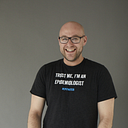Member-only story
So You Want To Work In Epidemiology?
A brief guide to getting into the field

Of the many impacts of the global pandemic we’ve found ourselves living through, one of the few welcome things has been the sudden and unexpected love of epidemiology. Two years ago, being an epidemiologist was a faintly embarrassing experience, where the phrase “I work in epidemiology” was either met with a blank stare or questions about people’s skin.
Sometimes I thought I should get a t-shirt saying “no, that’s a dermatologist” just to answer the question quickly.

And with this vague semi-anonymity came a bemused indifference to the profession. Epidemiology is, after all, not particularly glamorous — there’s a lot of tedious staring at spreadsheets involved — and in most places not that well paid either. But now, after 18 months of seeing epidemiologists appear on the TV and radio, everyone’s suddenly keen to pursue the career of their dreams and sit in front of a monitor trying to get their SAS code to work for the 50th time this week.
So here’s a very brief guide into why it’s a brilliant career path and how to do it for all you eager beavers who want to get involved in saving lives on a population scale.
The Glamour
Everyone who gets into health services wants to be a heart surgeon, or a trauma nurse, because these are professions where not only do you get paid reasonably well, but you are someone who saves lives on a daily basis.

But what if I told you that you could probably save more lives with a spreadsheet than a scalpel? It sounds trite — and to an extent it is — but epidemiology has been behind some of the greatest health successes of our time. You can rid the world of infectious diseases, fortify foods with essential nutrients, prevent countless cases of cancer and death, all by studying how diseases occur in a population and figuring out what to do to prevent them in the future.
